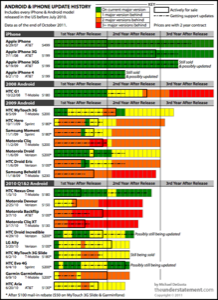Companies and consumers trying to decide which mobile/smartphone OS to adopt might want to look over Michael DeGusta’s Android support history chart. DeGusta paints a sad story indeed, demonstrating that no Android phone has consistently received timely OS updates over its lifecycle. In fact, some phones have never been current at all, shipping with Android releases that were two major versions behind, and never receiving updates.

The best Android phone to have, says DeGusta, is the HTC Nexus One. At nearly two years after release, the Nexus One has only suffered a brief two-month period of being just one version behind the major Android release.
Assuming most phones are sold with a two-year contract period, only two Android phones sold in the U.S. are out of contract. The HTC G1, the HTC MyTouch 3G and HTC Hero have all entered their third year. Several Android phones are reaching the two-year mark, including the HTC Droid Eris, Motorola Droid and Cliq, and Samsung Moment.
The numbers are ugly. Seven of the 18 phones never had a current Android release, and 13 of the 18 phones stopped receiving updates entirely before the device stopped selling. Not just major OS updates, but security updates.
The Ice Cream Sandwich (ICS) update you’ve been hearing so much about? Yeah, you probably won’t be seeing that on 16 of the 18 phones that DeGusta examined.

Why This is Bad
Now, as long as the phone continues to work as well as it did when it was purchased, you might think this is no big deal. The consumer gets what they paid for, and they have all the features they signed up for, right?
As DeGusta points out, and should be obvious, there’s a small matter of security updates. These aren’t just phones, they’re computers sitting in your pocket. Computers that have security vulnerabilities.
But this also hampers developers because they’re stuck targeting old, old, old releases of Android. So all the nifty new features that Google likes to talk about with major releases, like ICS? Yeah, no go. You would think that the Android folks would want to keep developers happy. But Android developers are stuck targeting ancient releases of Android if they want to be compatible with the majority of phones on the market.
This is one major argument in favor of Apple and iOS: It doesn’t depend on the carriers or other hardware vendors to do updates. Apple releases a new version of iOS, you get it whether you’re on AT&T, Verizon or Sprint. No doubt some users are still using old releases of iOS, but that’s by choice. Unless you’re willing to resort to rooting your phone, you’re stuck with the old.
As a long-time Linux guy, I really want to like Android. A year ago if you’d asked me about Android fragmentation, I would have said there’s no way it would be this bad. But the situation is really, really bad. If security and OS updates are high on your list of priorites, iOS seems to be the best choice.

















